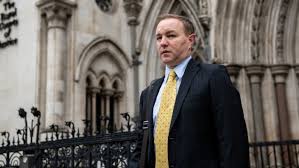
Introduction
Tom Hayes became a household name after being convicted for his role in manipulating the London Interbank Offered Rate (Libor), a benchmark interest rate that affects trillions of dollars in financial contracts worldwide. His case has not only highlighted the need for stricter financial regulations but also sparked debates about corporate ethics and accountability in banking practices.
The Libor Scandal Overview
The Libor scandal erupted in the early 2010s when it was revealed that several banks were colluding to manipulate the rate for profit. Tom Hayes, a former trader at UBS and Citigroup, was found to have played a significant role in this scheme. In 2015, he was convicted and sentenced to 14 years in prison for conspiracy to defraud, making him one of the first people to be jailed in connection to the scandal.
Hayes’ Influence on Financial Regulations
Since his conviction, Hayes has become a controversial figure in discussions around financial regulations. His case prompted regulatory authorities to reevaluate the mechanisms used for setting interest rates and led to significant reforms in the banking sector. The Financial Conduct Authority (FCA) and the Bank of England have implemented stricter guidelines designed to improve the integrity of the financial markets. In light of these changes, experts argue that Hayes’ actions have had a lasting impact on how banks operate and are regulated.
Public Interest and Media Representation
Hayes’ story has captured the public’s attention, leading to various media portrayals, including documentaries and news articles that examine his rise and fall. Critics often argue that the focus on individual traders like Hayes overshadows the systemic issues present in the financial sector. They contend that without addressing the root causes of such unethical practices, mere punishment of individuals will not suffice to deter future misconduct.
Conclusion
Tom Hayes’ involvement in the Libor scandal serves as a case study of the complexities tied to financial misconduct. His conviction has prompted a broader discussion about accountability in banking, leading to reforms that attempt to prevent similar abuses in the future. As the financial industry continues to evolve, the lessons learned from Hayes’ actions remain significant for policymakers, financial institutions, and the public alike. In a world where the stakes are high, the imperative for transparency and ethical practices cannot be overstated.
You may also like

Understanding Tax: Its Importance and Recent Changes

Current Insights on Shell Share Price

Strategies to Enhance Your Savings in 2023
SEARCH
LAST NEWS
- Remembering Wendy Richard: The Promise to Co-Star Natalie Cassidy
- How Did Anglian Water Achieve an ‘Essentials’ Rating for Mental Health Accessibility?
- Shai Hope Leads West Indies in T20 World Cup Clash Against South Africa
- What We Know About Weston McKennie: Future at Juventus and Past at Leeds
- What We Know About the Upcoming Live Nation Antitrust Trial